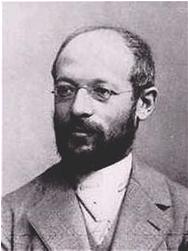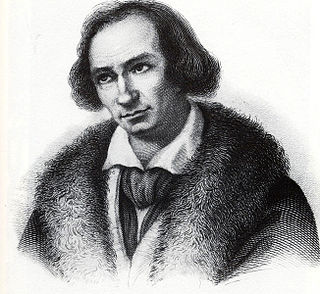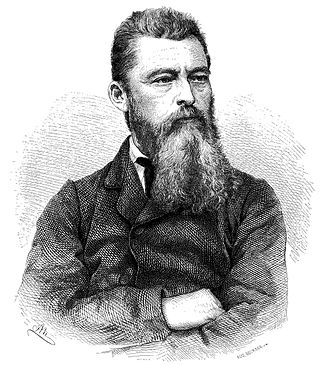
Bruno Bauer was a German philosopher and theologian. As a student of G. W. F. Hegel, Bauer was a radical Rationalist in philosophy, politics and Biblical criticism. Bauer investigated the sources of the New Testament and, beginning with Hegel's analysis of Christianity's Hellenic as well as Jewish roots, concluded that early Christianity owed more to ancient Greek philosophy (Stoicism) than to Judaism.

Georg Simmel was a German sociologist, philosopher, and critic.

Johann Kaspar Schmidt, known professionally as Max Stirner, was a German post-Hegelian philosopher, dealing mainly with the Hegelian notion of social alienation and self-consciousness. Stirner is often seen as one of the forerunners of nihilism, existentialism, psychoanalytic theory, postmodernism and individualist anarchism.

Immanuel Hermann Fichte was a German philosopher and son of Johann Gottlieb Fichte. In his philosophy, he was a theist and strongly opposed to the Hegelian School.

Friedrich Wilhelm Joseph Schelling, later von Schelling, was a German philosopher. Standard histories of philosophy make him the midpoint in the development of German idealism, situating him between Johann Gottlieb Fichte, his mentor in his early years, and Georg Wilhelm Friedrich Hegel, his one-time university roommate, early friend, and later rival. Interpreting Schelling's philosophy is regarded as difficult because of its evolving nature.

Jakob Friedrich Fries was a German post-Kantian philosopher and mathematician.

Ferdinand Tönnies was a German sociologist, economist, and philosopher. He was a significant contributor to sociological theory and field studies, best known for distinguishing between two types of social groups, Gemeinschaft and Gesellschaft. He co-founded the German Society for Sociology together with Max Weber and Georg Simmel and many other founders. He was president of the society from 1909 to 1933, after which he was ousted for having criticized the Nazis. Tönnies was regarded as the first proper German sociologist and published over 900 works, contributing to many areas of sociology and philosophy. Tönnies, Max Weber, and Georg Simmel are considered the founding fathers of classical German sociology. Though there has been a resurgence of interest in Weber and Simmel, Tönnies has not drawn as much attention.

Paul Nicolai Hartmann was a Baltic German philosopher. He is regarded as a key representative of critical realism and as one of the most important twentieth-century metaphysicians.

Ernst Alfred Cassirer was a German philosopher. Trained within the Neo-Kantian Marburg School, he initially followed his mentor Hermann Cohen in attempting to supply an idealistic philosophy of science.

Karl Robert Eduard von Hartmann was a German philosopher, independent scholar and author of Philosophy of the Unconscious (1869). His notable ideas include the theory of the Unconscious and a pessimistic interpretation of the "best of all possible worlds" concept in metaphysics.

Karl Christian Friedrich Krause was a German philosopher whose doctrines became known as Krausism. Krausism, when considered in its totality as a complete, stand-alone philosophical system, had only a small following in Germany, France, and Belgium, in contradistinction to certain other philosophical systems that had a much larger following in Europe at that time. However, Krausism became very popular and influential in Restoration Spain not as a complete, comprehensive philosophical system per se, but as a broad cultural movement. In Spain, Krausism was known as "Krausismo", and Krausists were known as "Krausistas". Outside of Spain, the Spanish Krausist cultural movement was referred to as Spanish Krausism.

Wilhelm Dilthey was a German historian, psychologist, sociologist, and hermeneutic philosopher, who held G. W. F. Hegel's Chair in Philosophy at the University of Berlin. As a polymathic philosopher, working in a modern research university, Dilthey's research interests revolved around questions of scientific methodology, historical evidence and history's status as a science. He could be considered an empiricist, in contrast to the idealism prevalent in Germany at the time, but his account of what constitutes the empirical and experiential differs from British empiricism and positivism in its central epistemological and ontological assumptions, which are drawn from German literary and philosophical traditions.

Wilhelm Traugott Krug was a German philosopher and writer. He is considered to be part of the Kantian School of logic.
Johann Max Emanuel Plenge was a German sociologist. He was professor of political economy at the University of Münster.
Heinz Heimsoeth was a German historian of philosophy.
Helmut Reichelt is a German Marxian critic of political economy, sociologist and philosopher. Reichelt is one of the main authors of the “Neue Marx-Lektüre” and considered to be one of the most important theorists in the field of Marx's theory of value.

Georg Friedrich Daumer was a German poet and philosopher. He was educated at the gymnasium of his native city, at that time directed by the famous philosopher Hegel.
Lawrence Krader was an American socialist anthropologist and ethnologist.

The following list of works by German philosopher Georg Wilhelm Friedrich Hegel (1770–1831).

Ludwig Andreas von Feuerbach was a German anthropologist and philosopher, best known for his book The Essence of Christianity, which provided a critique of Christianity that strongly influenced generations of later thinkers, including Charles Darwin, Karl Marx, Sigmund Freud, Friedrich Engels, Mikhail Bakunin, Richard Wagner, and Friedrich Nietzsche.














